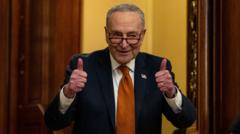The US government has narrowly avoided a shutdown, enacting a new budget that preserves operations after days of intense political wrangling. President Joe Biden signed the spending bill into law over the weekend, following its passage in the Senate, which voted 85-11 shortly after a midnight deadline, and a decisive House approval of 336-34 hours earlier. Although the budget averted a shutdown that could have put millions of federal employees on unpaid leave or required them to work without pay, it controversially lacked President-elect Donald Trump's request to raise the federal borrowing limit.
Current federal debt stands at approximately $36 trillion, with a growing portion allocated solely to interest payments rather than national defense. The consequences of a shutdown would have been severe, affecting public services such as parks, food assistance programs, and various federally-funded initiatives, with delayed aid also impacting disaster recovery efforts and farmers relying on federal support.
Negotiations for the new funding bill came to a head earlier this week when discussions fell apart after Trump and tech billionaire Elon Musk urged Republican lawmakers to reject the agreed terms. The current budget, formally known as the American Relief Act, 2025, is a condensed version of a previously rejected 1,547-page proposal and will maintain government funding at its existing levels until March 14 of the next year.
While Trump's demands around lifting the debt ceiling were not reflected in the final budget, Republican leaders have indicated this contentious issue will be revisited in early 2025. House Democratic minority leader Hakeem Jeffries emphasized the unsustainable nature of attempting to include a debt ceiling increase at the last minute, later celebrating the passage of the bill as a victory against what he characterized as a “billionaire boys club.”
The final agreement was a compromise that stripped away various provisions initially advocated by Democrats, including a long-overdue pay raise for lawmakers and essential healthcare reforms. However, it does incorporate substantial allocations, including $100 billion earmarked for disaster relief and $10 billion dedicated to aid for farmers. Notably, the bill also commits to full federal funding for rebuilding Baltimore's Francis Scott Key Bridge, which suffered damage earlier this year.
Musk, who has been appointed by Trump to manage government spending, vocally opposed elements of the earlier proposal, contributing to its withdrawal. In light of the current political landscape with Trump set to take office and Republicans holding both houses of Congress, Speaker of the House Mike Johnson expressed optimism about entering a new legislative phase come January. Nonetheless, he faces dissent within his own party, which raises concerns about his leadership future as he prepares for a key vote to retain his position.
Johnson described the sentiment of progress in resolving the budget, indicating that frequent dialogues with Trump and Musk were instrumental during negotiations. Musk lauded Johnson's efforts in a social media post, suggesting the final budget's transformation from an unwieldy proposal to a concise and effective one under the heightened political stakes.





















